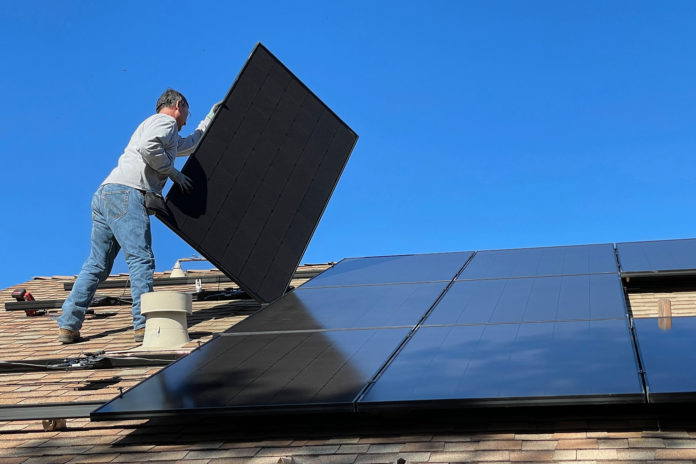
Houses, regardless of location, may now install unlimited solar panels on their rooftops without any requirement for planning permission (subject to certain conditions).
The Minister for Housing, Local Government and Heritage, Darragh O’Brien, TD, has signed into law revised planning exemptions for the installation of solar panels on the rooftops of houses and certain non-domestic buildings. The exemptions are aimed at increasing Ireland’s generation of solar energy and combating climate change and will take immediate effect.
These regulations aim to bring Ireland into line with the EU’s Solar Rooftops Initiative by making permitting procedures for installing solar on rooftops shorter and simpler. It supports a target of installing up to 380MW (approximately 1 million solar panels) of microgeneration capacity as part of Ireland’s overall solar targets under the Government’s Climate Action Plan.
This would generate over 300 GWh of renewable electricity per annum, with the potential to abate 1.4 million tonnes of CO2eq over the lifetime of the installations.
The regulations will also support the rollout of small-scale generation and act as an enabler for the Small-Scale Generation Support Scheme (SSG), which is expected to become available next year.
CHANGES
Under the revised regulations the following is now allowed:
1) For solar panel installations on houses, there is no limit to the area of solar panels which can be installed on rooftops of homes, anywhere in the country. Solar installations will be able to cover the entire roof of a house. The 12sqm/ 50% roof limit which previously applied to houses has been removed nationwide.
2) For solar panel installations on rooftops of all other existing classes of development (Industrial; Light Industrial and Business Premises; Agricultural): rooftop solar installations covering the entire roof are exempt from requiring planning permission. However, in the 43 designated Solar Safeguarding Zones, a rooftop limit remains. Solar Safeguarding Zones are areas where rooftop limitations on solar panel installations apply, to mitigate the potential impact of glint and glare near airports, aerodromes and other sites with helipads like hospitals. The existing exemption of 50 square metres or less for the entire development has been increased to a rooftop limit of 300 square metres.
3) Apartments; educational building/ health centre or hospital/ recreational or sports facility/ place of worship/ community facility or centre/ library/ certain public utility sites: exemptions have been introduced for the first time for the installation of solar panels on the rooftops of such buildings, subject to conditions and limitations and the rooftop area limit in solar safeguarding zones where applicable.
4) Exemptions for wall-mounted and free-standing solar panel installations: free-standing solar panel installations for houses are exempted from the requirement to obtain planning permission subject to a 25 square metre area limit and conditions requiring a certain amount of private open space to be maintained for the use of occupants. The exempted area for all other categories except apartments is increased to 75 square metres. In addition, wall mounted solar installations of 75 square metres are exempted for industrial and agricultural.
Exemptions in relation to installations under points 1, 2 and 3 above are subject to, among other things, minor setback distances from the edge of the roof. Points 1-4 above are also subject to general restrictions on exempted development including those regarding protected structures and Architectural Conservation Areas.
Copies of the Planning and Development Act 2000 (Exempted Development) (No. 3) Regulations 2022 and the supporting Planning and Development (Solar Safeguarding Zone) Regulations 2022 will be available on the Irish Statute Book website. The Solar Safeguarding Zones are also available for viewing on the myplan.ie
CAN ENERGY GENERATED USING THE EXEMPTION BE SOLD BACK TO THE GRID?
There are no restrictions on the energy generated from solar installations on a house. Therefore, excess energy generated by a household may be sold back to the grid.
All other classes have a restriction that the installation shall be primarily for the production of energy for use within the building or sites’ curtilage.
The intention behind this limitation is to ensure that the buildings remain in use and do not change to a commercial energy generating use with the building falling vacant or derelict.
WHAT GRANTS ARE AVAILABLE FOR SOLAR PANEL INSTALLATION?
A solar electricity grant is available through the Sustainable Energy Authority of Ireland (SEAI) Solar PV Scheme. The scheme is funded under the Microgeneration Support Scheme, a government funded support Scheme introduced to provide a range of supports to assist homes to develop renewable generation for self-consumption.
The Scheme provides a grant towards the purchase and installation of a solar PV system on a domestic dwelling.







